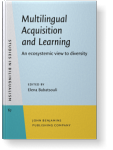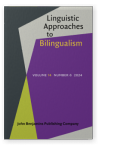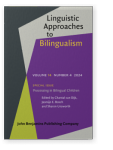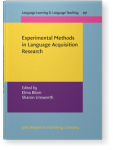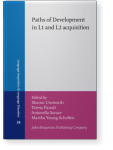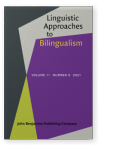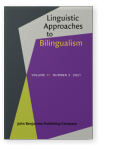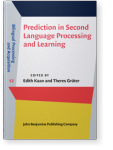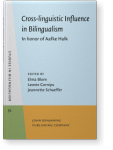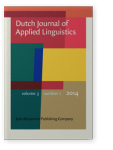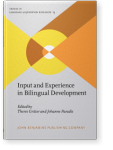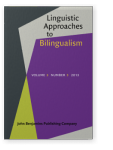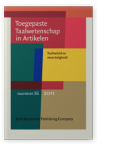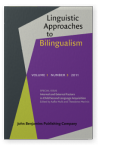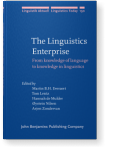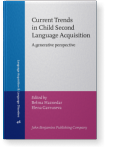Sharon Unsworth
List of John Benjamins publications for which Sharon Unsworth plays a role.
Book series
Journal
ISSN 1879-9264 | E-ISSN 1879-9272
Titles
Processing in Bilingual Children
Edited by Chantal van Dijk, Jasmijn E. Bosch and Sharon Unsworth
Special issue of Linguistic Approaches to Bilingualism 14:4 (2024) v, 174 pp.
Experimental Methods in Language Acquisition Research
Edited by Elma Blom and Sharon Unsworth
[Language Learning & Language Teaching, 27] 2010. vii, 292 pp.
Subjects Language acquisition | Psycholinguistics | Theoretical linguistics
Paths of Development in L1 and L2 acquisition: In honor of Bonnie D. Schwartz
Edited by Sharon Unsworth, Teresa Parodi, Antonella Sorace and Martha Young-Scholten
[Language Acquisition and Language Disorders, 39] 2006. viii, 222 pp.
Subjects Generative linguistics | Language acquisition | Theoretical linguistics
2024 Language processing in bilingual children: Why it matters, what we know and what is still missing Processing in Bilingual Children, Dijk, Chantal van, Jasmijn E. Bosch and Sharon Unsworth (eds.), pp. 435–445 | Review article
2024 Cognate facilitation in single- and dual-language contexts in bilingual children’s word processing Processing in Bilingual Children, Dijk, Chantal van, Jasmijn E. Bosch and Sharon Unsworth (eds.), pp. 577–608 | Article
We examined the extent to which cognate facilitation effects occurred in simultaneous bilingual children’s production and comprehension and how these were modulated by language dominance and language context. Bilingual Dutch-German children, ranging from Dutch-dominant to German-dominant,… read more
2023 Shared syntax and cross-linguistic influence in bilingual children: Evidence from between- and within-language priming Linguistic Approaches to Bilingualism: Online-First Articles | Article
This paper investigates the role of structural priming in cross-linguistic influence, a well-established yet poorly understood characteristic of bilingual language development. More specifically, we test the proposal that cross-linguistic influence may be conceptualized as between-language… read more
2021 Cross-linguistic influence in word order: Effects of age, dominance and surface overlap Linguistic Approaches to Bilingualism 11:6, pp. 783–816 | Article
The present study investigated cross-linguistic influence (CLI) in the word order of Dutch-English bilingual children, using elicited production and acceptability judgment tasks. The goal was to examine whether monolingual and bilingual children produced and/or accepted V2 word orders in… read more
2021 Differences in phonological awareness performance: Are there positive or negative effects of bilingual experience? Linguistic Approaches to Bilingualism 11:3, pp. 418–451 | Article
Children who have knowledge of two languages may show better phonological awareness than their monolingual peers (e.g. Bruck & Genesee, 1995). It remains unclear how much bilingual experience is needed for such advantages to appear, and whether differences in language or cognitive skills alter… read more
2021 Chapter 6. Prediction in bilingual children: The missing piece of the puzzle Prediction in Second Language Processing and Learning, Kaan, Edith and Theres Grüter (eds.), pp. 115–138 | Chapter
A wealth of studies has shown that more proficient monolingual speakers are better at predicting upcoming information during language comprehension. Similarly, prediction skills of adult second language (L2) speakers in their L2 have also been argued to be modulated by their L2 proficiency. How… read more
2017 Cross-linguistic influence in scope ambiguity: Evidence for acceleration Cross-linguistic Influence in Bilingualism: In honor of Aafke Hulk, Blom, Elma, Leonie Cornips and Jeannette Schaeffer (eds.), pp. 181–206 | Chapter
Cross-linguistic influence of interface-conditioned properties in bilingual language acquisition has been reported in a large number of studies and various linguistic domains. While many of these studies have found that cross-linguistic influence can occur in the form of delay, few have shown… read more
2014 Dutch and English literacy and language outcomes of dyslexic students in regular and bilingual secondary education Dutch Journal of Applied Linguistics 3:1, pp. 62–81 | Article
An increasing number of schools in the Netherlands offer bilingual (secondary) education, usually combining Dutch with English. As yet, it remains unclear whether students with dyslexia are able to cope in this type of educational setting. To address this question, the oral language and literacy… read more
2014 Comparing the role of input in bilingual acquisition across domains Input and Experience in Bilingual Development, Grüter, Theres and Johanne Paradis (eds.), pp. 181–201 | Article
Amount of exposure has been observed to affect the linguistic development of bilingual children in a variety of domains. As yet, however, relatively few studies have compared the acquisition across domains within the same group of children. Such a comparative approach is arguably essential to gain… read more
2011 Tweetalige Ontwikkeling en Tweetalig Onderwijs: Een Verslag van een Symposium Over Visies uit Onderzoek, Beleid en Praktijk Taalbeleid en meertaligheid, pp. 61–70 | Article
The topic of bilingualism in education continues to generate much debate. Issues under discussion include for example how best to support the Dutch language development of multilingual children and how to successfully implement bilingual secondary education and early foreign language instruction.… read more
2011
2010 Scope assignment in child language: On the role of the Question Under Discussion The Linguistics Enterprise: From knowledge of language to knowledge in linguistics, Everaert, Martin B.H., Tom Lentz, Hannah N.M. De Mulder, Øystein Nilsen and Arjen Zondervan (eds.), pp. 99–114 | Article
This paper focuses on recent work on children’s interpretation of scopally ambiguous sentences. We review current literature on the topic and we discuss two theoretical notions, namely the notion of surface scope and the notion of Question Under Discussion (QUD). We argue that both notions are… read more
2010 Chapter 10. Comparing L1 children, L2 children and L2 adults Experimental Methods in Language Acquisition Research, Blom, Elma and Sharon Unsworth (eds.), pp. 201–222 | Chapter
2008 Comparing child L2 development with adult L2 development: How to measure L2 proficiency Current Trends in Child Second Language Acquisition: A generative perspective, Haznedar, Belma and Elena Gavruseva (eds.), pp. 301–333 | Article
Most studies investigating the role of age in L2 acquisition compare L2 children and adults in terms of ultimate attainment (e.g. Johnson & Newport 1989). This paper addresses some of the methodological and conceptual issues which arise when, following Schwartz (1992), such a comparison is made in… read more
2006 Introduction Paths of Development in L1 and L2 acquisition: In honor of Bonnie D. Schwartz, Unsworth, Sharon, Teresa Parodi, Antonella Sorace and Martha Young-Scholten (eds.), pp. 1–14 | Miscellaneous
